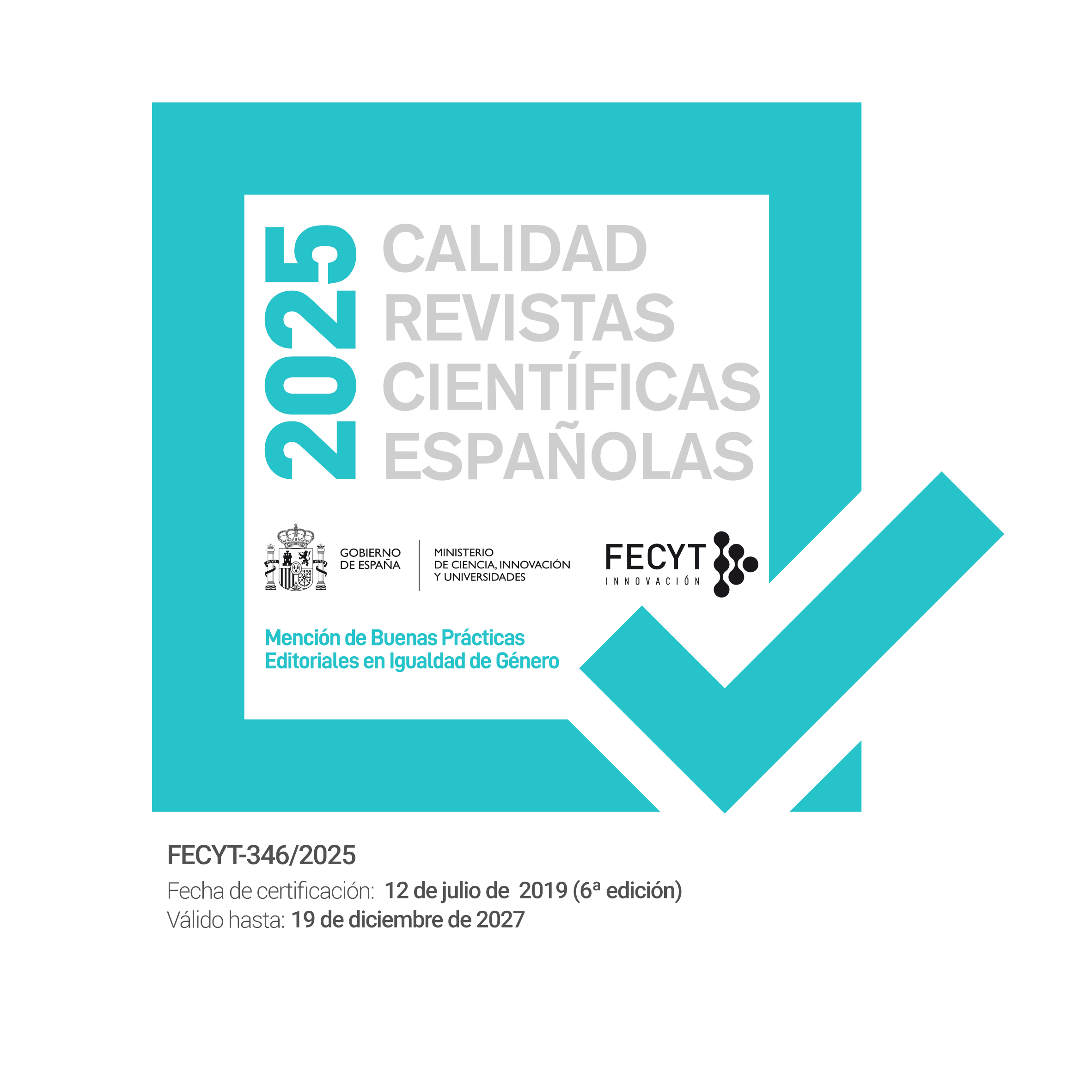Presence of political parties and newscast agenda during pre-campaign: spanish general elections in April 2019
Keywords:
agenda setting, TV newscast, Spanish elections, pluralism.Abstract
This article analyses the political parties’ presence and agenda-setting in Spanish TV’s main news outlets during the 2019 general elections precampaign. It records the time granted to each topic and candidature in 24 emissions on the 4 leading channels in both national and daily news share (La 1, Antena 3, Telecinco and La Sexta) during the 6 previous days to the beginning of the campaign. Results do not show proportionality in terms of party presence according to their previous percentage of the vote, La 1 being the most proportional. Insufficient coverage of some parties is shown; Unidas Podemos, PP and ERC are underrepresented whilst PSOE, VOX and Ciudadanos received the biggest media coverage according to the mentioned criteria. Synergies between media groups, the scarce thematic divergence between media channels and their distance from the main issues cited in surveys by the Spanish Center for Sociological Research (CIS) show profound democratic deficits.
Downloads
References
Alcalá, M. 2013. “Impacto de la concentración mediática en el pluralismo informativo”, Derecom 15: 64-76.
Apreza Salgado, S. 2013. “Concentración de medios de comunicación versus pluralismo informativo externo”, pp. 63-85 en Reforma de medios electrónicos. ¿Avances o retrocesos?, editado por R. Huber y E.
Villanueva. Ciudad de México: Biblioteca Juridica UNAM.
Bandera López, N. 2019a. “Pluralismo político y rol del moderador en tertulias televisivas: Al Rojo Vivo y Las Mañanas de Cuatro”, Miguel Hernández Communication Journal 10(1): 39-56.
Bandera López, N. 2019b. “Agenda y pluralismo mediático en Al Rojo Vivo y Las Mañanas de Cuatro”, Doxa Comunicación 29: 113-137.
Barlovento Comunicación. 2019. “Análisis mensual del Comportamiento de la Audiencia TV. Abril de 2019”. Madrid: Barlovento Comunicación. Consultoria audiovisual y digital, (enlace).
Behr, R. L. y S. Iyengar. 1985. “Television News, Real-World Cues, and Changes in the Public Agenda”, Public Opinion Quarterly 49(1): 38-57.
Berkowitz, D. 1987. “TV News Sources and News Channels: A Study in Agenda-Building”, Journalism Quarterly 64(2-3): 508-513.
Consell de l'Audiovisual de Catalunya. 2019. Informe específic de pluralisme a la televisió i a la ràdio durant la campanya de les eleccions a les Corts Generals 2019 (del 12 al 26 d’abril). Barcelona: Generalitat de Catalunya, (enlace).
Fernández Alonso, I y A. Fernández Viso. 2012: “Internal pluralism in the governance of public service broadcasters in Spain and the role of social groups and professionals. The case of RTVE”, Comunicación y Sociedad XXV(2): 203-230.
González Esteban, J.L. y C.M. López Rico. 2017. "Influencia de los medios hispanos en las elecciones presidenciales de EE UU en 2016", Revista Latina de Comunicación Social 72: 1483-1501.
Hallin, D.C. y P. Mancini. 2004. Comparing media systems: Three models of media and politics. Cambridge: Cambridge University Press.
Humanes, M. L. 2001. “El encuadre mediático de la realidad social. Un análisis de los contenidos informativos en televisión”, Zer: Revista de estudios de comunicación = Komunikazio ikasketen aldizkaria 6(11).
Humanes, M.L.; M.D. Montero Sánchez; R. Molina de Dios y A. López Berini. 2013. “Pluralismo y paralelismo político en la información televisiva en España”, Revista Latina de Comunicación Social 68: 566-581.
Guo, L.; H. Tien Vu y M. McCombs. 2012. “An expanded perspective on agenda-setting effects. Exploring the third level of agenda setting”, Revista de Comunicación 11: 51-68.
Kepplinger, H.M. 1989. "Instrumentelle Aktusalisierung. Grundalage einer Theorie pubizistischer Konflikte", pp. 199-220, en Massenkommunikation. Theorien, Methoden, Befunde, editado por M. Kaase y W. Schulz. Opladen: Westdeutscher Verlag.
León Gross, T. 2006. “La agenda de los noticiarios”, pp. 271-279 en Tendencias’ 06. Medios de comunicación, El año de la televisión, coordinado por J. Fernández Beaumont y B. Díaz Nosty. Madrid: Fundación Telefónica.
Mazzoleni, G. 1987. “Media Logic and Party Logic in Campaign Coverage: The Italian General Election of 1983”, European Journal of Communication 2: 81-103.
McCombs, M. [1994] 1996. “Influencia de las noticias sobre nuestras imágenes del mundo”, pp. 13-34 en Los efectos de los medios de comunicación. Investigación y teorías, editado por J. Bryant y D.
Zillmann. Barcelona: Paidós.
McCombs, M.; J.P. Llamas, E. López Escobar y F. Rey Lennon. 1997. “Candidate Images in Spanish Elections: Second-Level Agenda-Setting Effects”, Journalism & Mass Communication Quarterly 74: 703-717.
McChesney, R.W. 2013. Desconexión digital. Cómo el capitalismo está poniendo a Internet en contra de la democracia. Barcelona: El Viejo Topo.
Otjes, S. 2019. “‘No politics in the agenda-setting meeting’: plenary agenda setting in the Netherlands”, West European Politics 42(4): 728-754.
Palau Sampio, D; A. Carratalá y L. Valera Ordaz. 2017. “Mediatización y encuadres de campaña. Análisis comparado de la información de partidos y medios en las elecciones generales de 2015 en España”, El profesional de la información 26(4): 602-610.
Pérez Curiel, C. y S. Luque Ortiz. 2014. “Educación mediática y periodismo de calidad: propuesta de mediación y evaluación en informativos de la televisión pública”, Doxa Comunicación 19: 207-229.
Rubio Ferreres, J. M. 2009. “Opinión pública y medios de comunicación. Teoría de la agenda setting”, Gazeta de Antropología 25(1): 01.
Sánchez Castillo, S. 2018. “Audiovisual Politeness in TV Political Interviews”, Communication & Society 31(2): 137-152.
Sevenans, J.; S. Walgrave y G.J. Epping. 2016. “How Political Elites Process Information From the News: The Cognitive Mechanisms Behind Behavioral Political Agenda-Setting Effects”, Political Communication, 33(4): 605-627.
Downloads
Published
How to Cite
Issue
Section
License
Copyright (c) 2020 Encrucijadas. Revista Crítica de Ciencias Sociales

This work is licensed under a Creative Commons Attribution-NonCommercial-NoDerivatives 4.0 International License.
Los autores/as conservan los derechos de autor y ceden a la revista el derecho de la primera publicación, con el trabajo registrado con la licencia de atribución de Creative Commons Reconocimiento-NoComercial (CC-BY 4.0), que permite a terceros utilizar lo publicado siempre que mencionen la autoría del trabajo y a la primera publicación en esta revista. Encrucijadas permite y se anima a todas las personas autoras a depositar la versión final publicada en repositorios institucionales o temáticos de acceso abierto, cumpliendo en caso necesario los términos establecidos por la entidad financiadora de la investigación.





